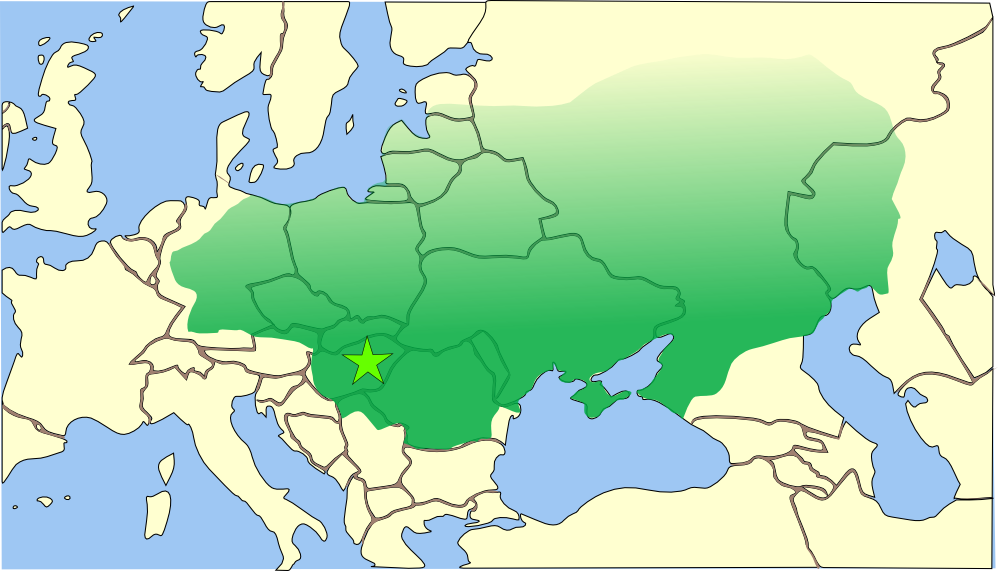Germany is not a western European country. Germany has been under Hunnic influence since the early days. Germans put words together into very long words like Asian people do

Which doesn't mean Germans are not indigenous.
The Huns came from the East, but there already lived people in the West.
The
Huns were a
nomadic group of people who are known to have lived in
Eastern Europe, the
Caucasus, and
Central Asia.The Huns first appeared in Europe in the 4th century. In 395 the Huns began their first large-scale attack on the Eastern Roman Empire. In 451, Attila's forces entered
Gaul
Huns - Wikipedia, the free encyclopedia
A suggested path of Hunnic movement westwards
The
Barbarian invasions of the 5th century were triggered by the destruction of the Gothic kingdoms by the Huns in 372-375. The city of Rome was captured and looted by the
Visigoths in 410 and by the
Vandals in 455
The
Germanic tribes are
thought to date from the
Nordic Bronze Age or the
Pre-Roman Iron Age. From southern Scandinavia and north Germany, they expanded south, east and west from the 1st century BC, coming into contact with the
Celtic tribes of
Gaul as well as
Iranian,
Baltic, and
Slavic tribes in
Central and
Eastern Europe.
[27] Under
Augustus, Rome began to invade Germania (an area extending roughly from the
Rhine to the
Ural Mountains). In AD 9, three
Roman legions led by
Publius Quinctilius Varus were
defeated by the
Cheruscan leader
Arminius. By AD 100, when
Tacitus wrote
Germania, Germanic tribes had settled along the Rhine and the Danube (
Limes Germanicus), occupying most of the area of modern Germany; Austria, southern
Bavaria and the western
Rhineland, however, were Roman provinces.
[28]
In the 3rd century a number of large West Germanic tribes emerged:
Alemanni,
Franks,
Chatti,
Saxons,
Frisii,
Sicambri, and
Thuringii. Around 260, the Germanic peoples broke into Roman-controlled lands.
[29] After an invasion by the
Huns in 375, and with the decline of Rome from 395, Germanic tribes moved further south-west. Simultaneously several large tribes formed in what is now Germany and displaced the smaller Germanic tribes. Large areas (known since the
Merovingian period as
Austrasia) were
occupied by the Franks, and Northern Germany was ruled by the Saxons and Slavs.
[28]
Germany - Wikipedia, the free encyclopedia
The Hunnic Empire
420–469 at its peak under
Attila (in power in 445):
Once the Hun political unity failed the ethnos lacked a way to re-create it, especially because the Huns had become a multiethnic empire even before Attila. The Hun Empire included, at least nominally, a great host of diverse peoples, each of whom may be considered "successors" of the Huns. However, given that the Huns were a
political creation, and not a consolidated people, or nation, their defeat in 454 marked the end of that political creation. Newer polities which later arose might have consisted of people formerly in the Hun confederacy, and carrying closely related steppe cultures, but they represented
new political creations
Locations of Hun successor states in 500 AD
Frisians Rule!

Thats why i dont understand this stupid militaristic bla bla here. I would never join an army. I see myself as too good for that. I love life and would never waste it for such nonsense.






 I see you wish Germany to follow Japans' footstep in re-militarization, i don't think the majority of Germany has the urge to revive this spirit at the current time or any time soon.
I see you wish Germany to follow Japans' footstep in re-militarization, i don't think the majority of Germany has the urge to revive this spirit at the current time or any time soon.












